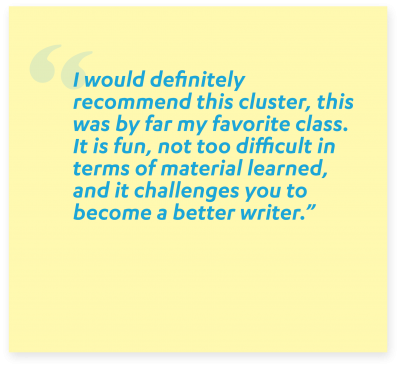CLUSTER 30
| Lecture Schedule: | Monday and Wednesday | 2:00 P.M. – 3:15 P.M. |
| Faculty: | Sara Burdorff | Undergraduate Education Initiatives, Coordinator Olga Yokoyama | Linguistics Willeke Wendrich | Cotsen Institute of Archaeology Tim Tangherlini | Asian Languages & Cultures Sander Goldberg | Classics |
| Librarian: | Simon Lee | Powell |
| Writing Consultant: | Peggy Davis | Writing Programs |
| Inquiry Specialist: | Hanna Young |
Stories hold our world together. Myths explain the origins of things; they establish, justify, and reinforce the patterns of nature and culture. Folklore preserves expectations, advice, and the wisdom of collective experience from one generation to the next. We tell stories to understand ourselves, and to shape to our understanding of others. Stories show us the way things are, the way they were, and the way they ought to be.
Students in this cluster will gain experience with a range of scholarly approaches to the study of myth and folklore. Our course will emphasize the academic investigation and analysis of narratives from a global array of cultures (including Ancient Egypt, Greece and Rome, Eurasia, and Northern Europe), from ancient civilizations to modern day, with particular emphasis on uncovering how and why stories carry the meaning(s) they do.
What are the Benefits?
- Satisfy 4 GEs requirements
- Satisfy Writing II requirement
- 18 units toward degree
- College Honors units including Honors Collegium
- Priority Enrollment in Eng. Comp. 3
Foundation Area General Education Credit
Upon completion of all three quarters of the cluster, students will satisfy 4 GE course requirements:
- 2 in Foundations of the Arts & Humanities (Literary and Cultural Analysis; Philosophical and Linguistic Analysis)
- 2 in Foundations of Society & Culture (1 in Historical Analysis; 1 in Social Analysis)
Course Format
There will be two lectures every week, and a two-hour discussion section. In addition, films reflecting the tenacity and impact of myth in modern popular cultures will be screened on some evenings, in conjunction with teaching-team-hosted dinners in DeNeve.
Topics covered will include:
- Myth as Foundation of Culture
- Stories as Lessons: Advice and Caution
- Adaptations and Evolutions of Myth
- Folklore, Ritual, and the Power of a Good Story
- Personal, Social and Political Narratives
- Mythological Afterlives in Popular Culture
Spring Seminars
During spring quarter, students choose a seminar that allows them to explore a particular topic in greater depth. Previous seminar topics have included:
- Mythological and Modern Heroes
- Myth into Epic
- Mythic Structures in Film and Television
- Gender and Myth
- Myth, History, and Culture
- Myth in Contemporary Art and Literature

